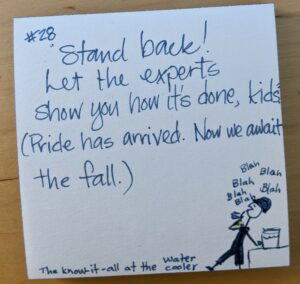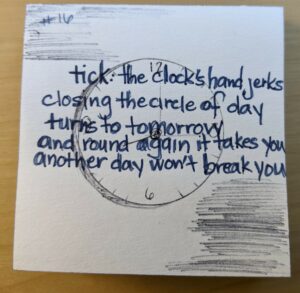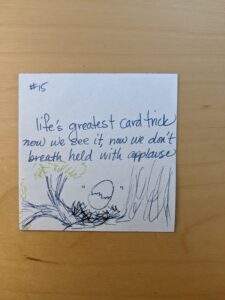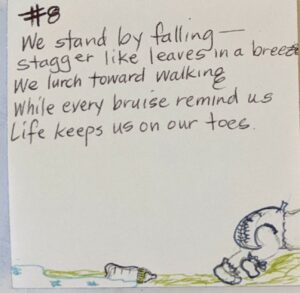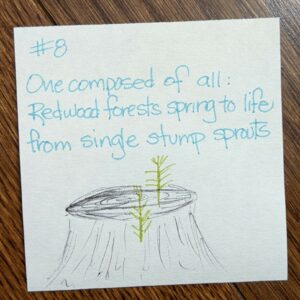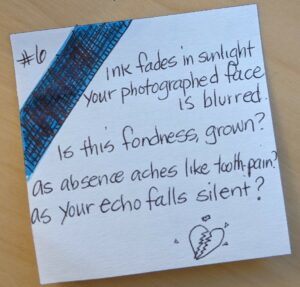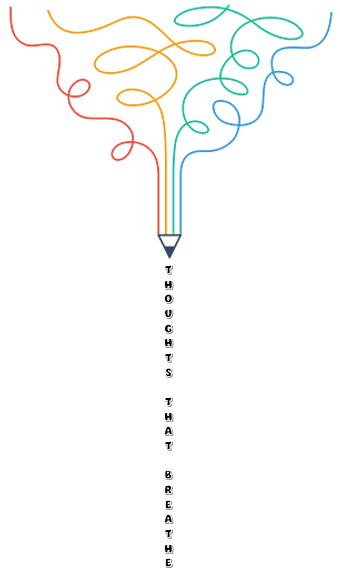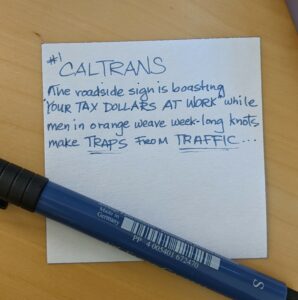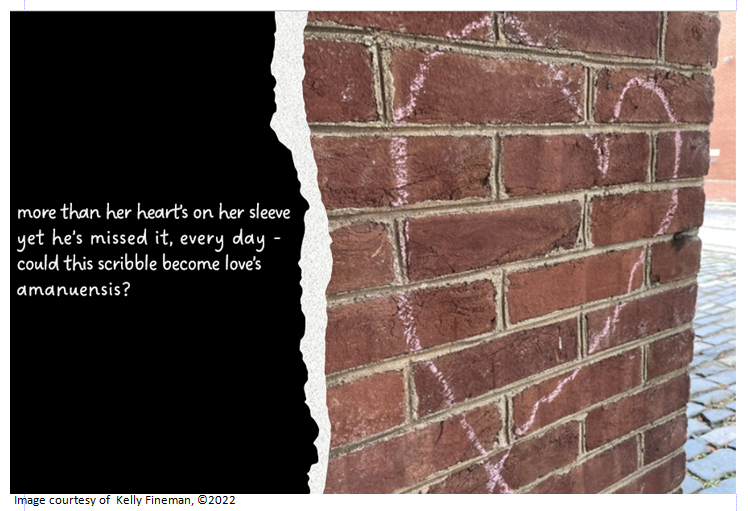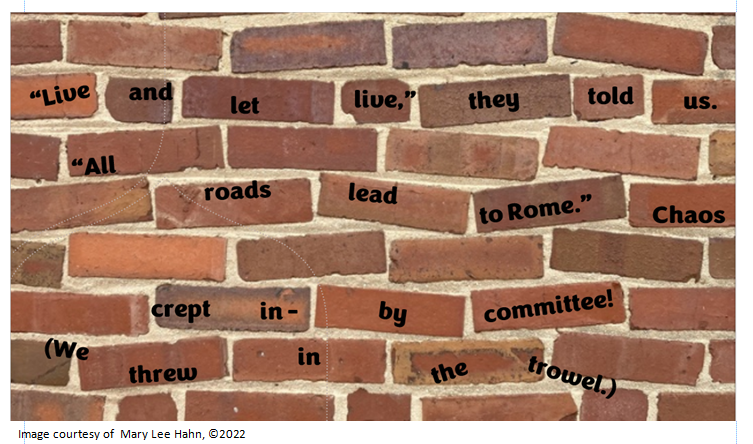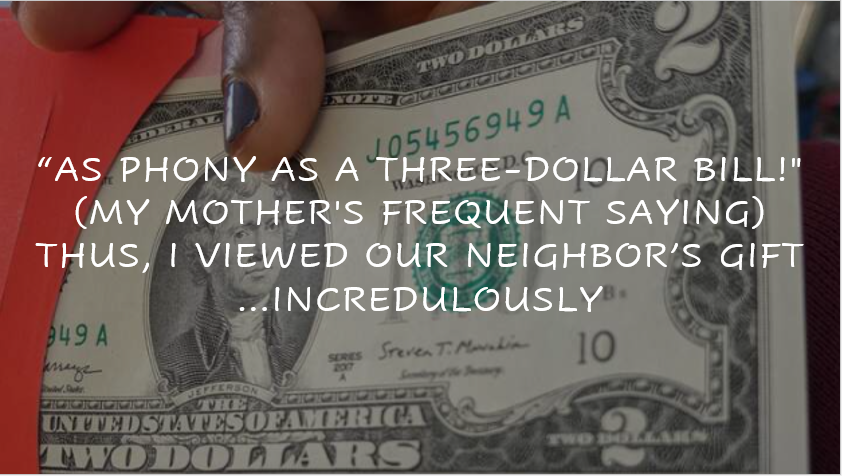
Poetry Peeps! You’re invited to our challenge in the month of February! Here’s the scoop: We’re doing Exquisite Corpse poetry. These collaborative poems necessarily involve yourself and at least one other passing lines or stanzas along, so now’s the time to start choosing compatriots. Are you in? Good! You’ve got a month to craft your creation(s), then share your offering with the rest of us on February 25th in a post and/or on social media with the tag #PoetryPals.
Seeing as I’ve stayed in lately, I was fully prepared to use the random conversations the neighbor has with the postman for my “eavesdropped and overheard” when I overheard something wholly unintentionally. The Boy was on a work Zoom with a coworker that turned personal. A young female in a male-dominated field, she was desperate for advice over what to me seemed a clear case of workplace harassment. I won’t recount details, but a single line I couldn’t erase from memory. She said, “I don’t want to ruin his life forever.”
You can imagine the angst and dread in her voice as she said it, and my chills as I heard it. “Ruin” is the same hyperbole used in the 2016 California court case when a judge handed down a six month sentence to a man who assaulted an unconscious woman. As his whole life shouldn’t be ruined, he was given six months – of which he served three. “Ruin” is a word used for thousand year old civilization remains, for catastrophic damage after a tsunami, not for a person being confronted with the consequences of their actions. I wanted to tell my husband’s young coworker this and so many, many other things… but it was neither my conversation nor my business, so I poured the words into a poem.
(Thank goodness for poetry.)
I searched first for a form that had repetition, and the pantoum lent itself neatly, as the thoughts I had bounced around in different order, sometimes making sense, other times making new ideas. I suspect all the reasons, defenses, excuses and facts bounced through this woman’s head as well. I’m not sure I like all the lines equally… I’m not sure that I wouldn’t, a day or two later, want to say something else, but this is a pantoum written in a single, heated, emotional moment. It’s all I have to bring today— This, and my heart beside— …
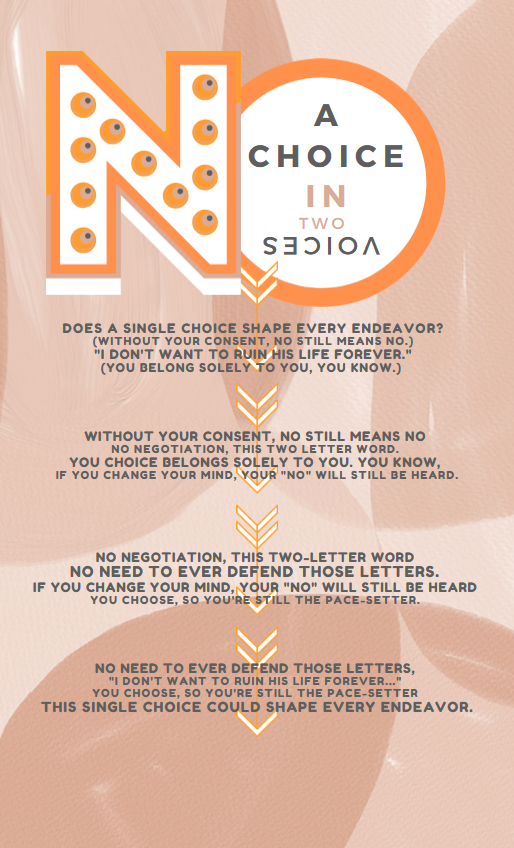
NO: A Choice in Two Voices
Does a single choice shape every endeavor?
(Without your consent NO still means no.)
“I don’t want to ruin his life forever.”
(Your choice belongs solely to you, you know.)
Without your consent, NO still means NO –
No negotiation, this two letter word.
Your choice belongs solely to you. You know
If you change your mind, your “no” will still be heard.
No negotiation, this two-letter word –
No need to ever defend those letters.
If you change your mind, your “no” will still be heard
You choose, so you’re still the pace-setter.
No need to ever defend those letters,
“I don’t want to ruin his life forever…”
You choose, so you’re still the pace-setter
This single choice could shape every endeavor.
There’s an awful lot of poetic scuttlebutt being passed on the interwebs today. Laura’s poem is here. Cousin Mary Lee is over hearing over here, while Sara is here listening. Liz is is right here. Miss Andi’s beautiful tribute is here. Here’s Michelle’s artful and art-filled post, and here’s Carol V’s. More Poetry Peeps may yet be stopping by, so stay tuned.
Need more? Poetry Friday today is hosted by Irene Latham at Live Your Poem. Thanks, Irene!
Happy Weekend – it’s sometimes a cold, hard world out there as we all know. Keep warm, keep well, and keep going, friends. You’ve got this.
 One of the Poetry Princess the other day mentioned how she likes that I sometimes write about things I don’t like. I kind of laughed – there are a LOT of things I don’t like, and honestly, I need to write poems about them so no one else has to hear my rants. Today I’m writing about an American proverb I don’t particularly enjoy. It was yet another of those often repeated during my childhood. It’s one which seems to imply incompetence needing to step aside for those who are better equipped to carry things out. It’s just… irritating.
One of the Poetry Princess the other day mentioned how she likes that I sometimes write about things I don’t like. I kind of laughed – there are a LOT of things I don’t like, and honestly, I need to write poems about them so no one else has to hear my rants. Today I’m writing about an American proverb I don’t particularly enjoy. It was yet another of those often repeated during my childhood. It’s one which seems to imply incompetence needing to step aside for those who are better equipped to carry things out. It’s just… irritating.